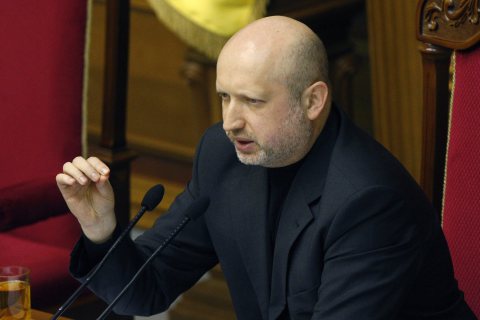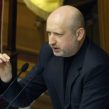
Ukraine Confronts Security Challenges Amid Regime Transition
Publication: Eurasia Daily Monitor Volume: 11 Issue: 37
By:

Ukraine has embarked on regime transition. The interim leadership now confronts an entirely new mix of challenges to national and civil security, of greater complexity and intensity than anything in the country’s experience since 1991.
Thousands of participants in the recent protest movement are still encamped in Kyiv, some of them retaining their combat equipment. They insist on overseeing the politicians from a position of moral authority. The state’s interim leadership gingerly seeks to demobilize them and facilitate their return to normal life in dignity. Many thousands of weapons with ammunition are missing from looted police and military barracks in Ukraine’s western and central oblasts. Throughout the country, new cases are reported of oblast and city authorities resigning under pressure (and, in some cases, being replaced) by local groups unaccountable to central authorities—a spontaneous trend that started in early February and has apparently not yet run its course. Local “Maidan self-defense” groups act in parallel with, and instead of, law enforcement agencies in major provincial cities. In Ukraine’s south-east and in Crimea, some power structures demarcate themselves from Kyiv. Meanwhile, Kyiv authorities have to deal with unconfirmed reports on Russian naval and troop movements around the Crimea (UNIAN, Interfax-Ukraine, February 23–25).
While most of those problems seem manageable in due course, the challenge from centrifugal trends in the country is seen as the most urgent to address by Kyiv authorities. Those trends are manifest both in Ukraine’s west and in parts of the south-east; the latter being potentially far more problematic than the former. Ukraine’s interim authorities, which took over on February 21, must respond to these manifold challenges with severely depleted resources, and a law-enforcement system half-paralyzed after three months of civil conflict (see below).
On February 22, the Russophone nomenklatura from four south-eastern oblasts and Crimea held a congress in Kharkiv, pre-announced and openly encouraged by Moscow. Dissatisfied by the regime change in Kyiv, the congress claimed more powers for those territories (see EDM, February 25).
Instantly responding with its own resolution, the Verkhovna Rada (national parliament) condemned “separatism” and instructed Ukraine’s Security Service (SBU) to investigate organizers of “separatist” activities (Rada TV, February 22).
On February 23 Verkhovna Rada’s chairman and acting head of state, Oleksandr Turchynov, told the country on television about his top priorities on internal security: to defuse any tensions between the south-east and the west, restore rule of law and the central authorities’ control across the country, guarantee civil peace and order, and not allow mob rule. As top priority, “We must give a harsh answer to any separatism and threats to Ukraine’s territorial integrity” (RFE/RL, February 24).
Addressing the Verkhovna Rada on February 25, and meeting with law enforcement ministries’ and agencies’ chiefs on the same day, Turchynov stated that “separatism has become a serious threat,” and any “infringements of Ukraine’s territorial integrity should be punished in accordance with the law.” Rada deputies across party lines decried the ongoing “seizures of local administrations and mass violations of public order (www.iportal.rada.gov.ua; Channel 5 TV, February 25).
A Ukrainian government is not yet in place. Law-enforcement institutions seem slow to regain their bearings after an exhausting civil conflict, and are hamstrung by a perceived loss of legitimacy.
The National Security and Defense Council (NSDC) issued a statement condemning “irresponsible politicians who, adding to instability and splits in society, have started speaking about a need to federalize the country… Ukraine must be a sovereign unitary state” (UNIAN, February 23). But this seems more rhetorical than operational. The NSDC has long been allowed to degrade under two consecutive presidencies, and has no chief since Andryi Klyuyev resigned on January 24 to become Viktor Yanukovych’s presidential administration chief. In his final statement in the latter capacity on February 21, Klyuyev decried “centrifugal tendencies in both west and south-east,” and was shot and wounded in a targeted attack four days later (Interfax-Ukraine, February 21, 25).
For its part, the SBU “again emphasizes that it will react severely to any infringements on Ukraine’s territorial integrity or manifestations of separatism” (UNIAN, February 22). But the SBU’s newly appointed chairman, Valery Nalyvaychenko, stated from the Verkhovna Rada’s rostrum that the SBU’s first-deputy chairmen are AWOL, the service “lacks communications with the regional directorates […] and the failure of coordination among agencies in the entire law-enforcement system has become a threat to national security.” The SBU’s staff is stretched thin to “stop crime, provide security for every citizen as a top priority, and protect high-risk installations,” according to Nalyvaychenko, himself a respected former SBU chairman (Interfax-Ukraine, February 23, 24).
Internal Affairs Minister Arsen Avakov in his turn called from the Rada’s rostrum for “an end to the senseless seizures of the seats of state power” (at oblast and city levels). The ministry intends to focus on consolidating law and order in the south-eastern oblasts Kharkiv, Donetsk, Luhansk, and Dnipropetrovsk as well as in Crimea, according to Avakov (Interfax-Ukraine, February 23). Avakov (a politician from Kharkiv, nominated by Turchynov’s Batkivshchina party as minister) and Nalyvaychenko (nominated by Vitaly Klychko’s UDAR party as SBU chairman) flew to Simferopol in the Crimea on February 24 to assess the situation there. In several south-eastern oblasts, where Kyiv’s writ does not seem to run at this stage, local “Maidan self-defense” groups oust the former regime’s holdovers while constraining the leeway of pro-Russia groups (see accompanying article).




